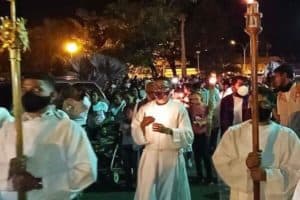Venezuelan diocese mourns drowning victims
THE LIFELESS BODIES of the drowning victims were lined up in the port of the city of Güiria, Venezuela. Lying side by side, swollen by the water, half naked, their faces deformed and partly eaten away by fish. It was a macabre image of the tragedy that is afflicting Venezuela. Another 16 corpses were washed up on the shore by the ocean currents a week later. The dead were among the occupants of two boats which had set out Dec. 6 from the fishing port of Güiria, in the state of Sucre in northeast Venezuela, hoping to cross the 60 miles or so separating them from Puerto España, the capital of Trinidad and Tobago.

“At first, they found 16 bodies, then 21, now today we have been informed that there are as many as 27. It is horrible. We still do not know for sure how many people were on those boats. But there are bodies of children, young people, pregnant women. The people are desperate, and ready to risk an adventure that has ended in tragedy,” said Bishop Jaime Villarroel of Carúpano, speaking with Aid to the Church in Need (ACN).
The desperation the bishop speaks of has already led more than 4.5 million Venezuelans to leave their country in an effort to escape poverty and hunger. Today the levels of poverty and inequality have left the once wealthy nation of Venezuela lagging behind countries such as Chad and the Democratic Republic of the Congo.
In fact, boats set out from Güiria almost every week. The criminals running them charge $500 per person. And they are dangerous routes, long used by traffickers to smuggle gasoline and drugs, and now used to traffic human beings. “We have a team of workers there, and we have a house to shelter passing migrants. We are doing a great deal there so that young people and others will not have to set out, risking their lives, and so that these tragedies will not have to happen. But sadly, we cannot stop the practice, and as a result many families from here, from our diocese and from Venezuela generally, are left mourning their loved ones,” said the bishop.
Interviewed by ACN, the bishop also accused criminal groups in both countries of taking advantage of people in their need and charged the Venezuelan authorities with not fulfilling their proper responsibilities. “It is an extremely complex and difficult situation,” he said. “Our people have exhausted themselves praying, begging, demanding that the relevant authorities do something to respond to all that has happened to these families, who are suffering so greatly. Please pray for them,” he added.
“We travelled immediately to Güiria to support the families with our presence, helping them with food, medical attention, and psychological care. Then we held a religious ceremony to encourage and console them and plant a little seed of hope and trust in the Lord,” Bishop Villarroel said.
According to accounts by members of the victims’ families, the boats had arrived in Trinidad and Tobago and had then been forced by the authorities to turn back, without being given an opportunity to refuel. The first victim to be recovered from the water turned out to be the sister of a Caritas volunteer. “Her body was in an advanced state of decomposition; it was only possible to recognize her by her tattoos,” the bishop said.
“We pray that God may have mercy on our faithful, and on all our people, that they may be able to live in dignity and find hope in such a hard and difficult situation. And we thank you and all the other international organizations for the support you are giving our people. Please do not forget us in our suffering, Bishop Villarroel concluded.
—Maria Lozano

